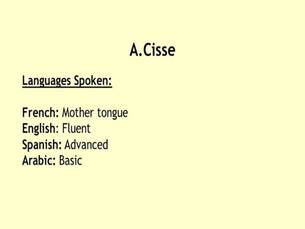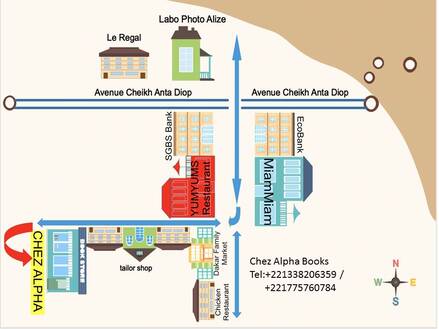
My day to day role, working to advise and support international students often requires me to review their CV prior to submission for a professional opportunity or graduate program. Under the section that asks Languages Spoken, many of my Senegalese students who are fluent in Wolof proudly display French and English along with German, Italian, Spanish, etc. yet Wolof is often omitted. In a broader sense these same students are also not including Jola, Sereer or Pulaar, etc. as in addition, to Wolof other languages are spoken in Senegal including Jola, Malinka, Pulaar, Sereer, and Soninke which were all deemed national languages by Article I of the 1971 Senegalese constitution (http://www.languageeducationpolicy.org/lepbyworldregion/africasenegal.html) Because they are fluent in Wolof, when I ask them why it is omitted, many seem shocked and surprised. They share with me how it never occurred to them to include Wolof or any other language they speak at home on their CV in the Language Spoken section.
I remind my students that each year hundreds of foreign students arrive in Senegal for study abroad programs sponsored by the Council on International Educational Exchange CIEE), University of Minnesota, Mt Holyoke, Hobart and William Smith Colleges, to name a few. Upon their departure months later, the majority proudly display Wolof as a language spoken at an intermediate level or higher. When the study abroad student returns home, is their ability to learn Wolof perceived as a sign of global intelligence or recognized as an intercultural competency? Did they prioritize learning the language as a door that would lead to other opportunities. Or did they enjoy the people and the full experience to the degree where learning the language became integral to their experience abroad.
At the same, I tell myself, since the students I am working with our also studying abroad, perhaps their world view based on their current location does not really encourage or support recognition of this language. Yet, with so many of these learners studying law and economics, while aspiring for a career in diplomacy, I remind them that on the world stage Wolof, along with Swahili, French, English and Persian, etc. can be both a valued global competency and a bridge to other cultures.
It is clear that some of my students view Wolof as a language spoken by so few people it can’t be considered a major world language. Yet, Wolof connects countries from Senegal to The Gambia and Mauritania along with significant populations speaking the language in France, Italy, Spain and the U.S.A. Due to trade and business links, it is a language often recognized in neighboring Francophone countries as well. Perhaps my students learned that education; power and social mobility could only be found via speaking French, English or other “world languages.” This is a lesson that I can relate to because, I remember long ago when my son was ready for preschool the first place we took him was not impressed that he could not speak French. At two years old, he was speaking English and Wolof and the intent was for him to learn French in preschool. The Director pulled me aside one day to remark that he had limited French language skills. I reminded her that he was only two, and had time to learn French. More important, he was already speaking two languages very well. At the mention of Wolof, she shook her head and reminded me that they would not be speaking Wolof in that school. Jamais! (Never!) she said. We left to enroll in another school the same day, and he continued on to grasp basic French by age 3. I am left wondering if my students ever experienced this or worse, did they study in a secondary school like the one where I taught briefly in Dakar that penalized students each time they spoke Wolof by making them where a heavy metal collar? Or again, is it merely the fact that while completing their education outside of Senegal, it is easier to no longer view Wolof as a language integral to their present world.
Then I stop and remind myself that maybe not having Wolof on their CV was just an oversight on their part. But I took a moment to remind one such student of a line from a favorite Stevie Wonder song that says,
If it’s magic
Then with it why aren’t we as careful
As making sure we dress in style
Posing pictures with a smile
Language is special. While some may view it merely as a collection of words, I prefer to view it for the power and significant role it plays in shaping personal, social and cultural identity. In addition, watching my son learn Wolof from his grandmother was also magical!
Speaking with my student also put me on point. I need to live according to the commitment I was asking from them. You see, I have planning for some time to have Wolof – English story hours for children. When I first mentioned this idea, many people laughed and were quick to tell me that no one would come, but I laughed even more because years ago they told me no one would buy books!

 RSS Feed
RSS Feed
